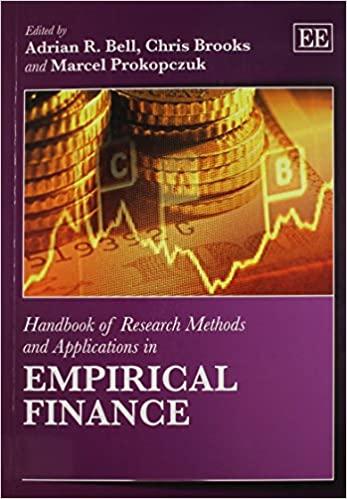Question
According to an article in the Wall Street Journal, options traders were expecting a large move in the price of Facebook stock. They were buying
According to an article in the Wall Street Journal, options traders were expecting a large move in the price of Facebook stock. They were buying both call options and put options with strike prices near the stock's current market price. The article described this strategy as a bet on the size of the [price] move instead of its direction.
Source: Saumya Vaishampayan, Options Traders Betting on Big Move for Facebook Shares, Wall Street Journal, April 27, 2016.
If the future price of Facebook stock increased above the current market price, traders would exercise the (put options/call options), (selling/buying) Facebook stock for (less/more) than the then market price. If the price of Facebook stock decreased from the current market price, traders would exercise the (call options/put options),(selling/buying) Facebook stock for (more/less) than the then market price. Traders would make money using this strategy if the (price of the unexercised options/ spread between the future and current market prices) was less than the (spread between the future and current market prices/price of the unexercised options).
[Related to the Making the Connection] In one of his annual letters to shareholders of Berkshire Hathaway, Warren Buffett wrote that trading derivatives has much more counterparty risk than does trading stocks or bonds because "a normal stock trade is completed in a few days with one party getting its cash, the other its securities. Counterparty risk therefore quickly disappears...."
Source: Warren Buffett, "Chairman's Letter," Berkshire Hathaway Inc. 2008 Annual Report, February 27, 2009.
Counterparty risk is:
A. the risk that the buyer or seller may be unwilling to fulfill the contract.
B. the risk that one party will sell the contract without notifying the other party.
C. the risk of bargaining.
D. the risk of the other party to the transaction defaulting.
Counterparty risk is greater for trading in derivatives because:
A. the transaction is completed before the underlying asset matures.
B. the transaction is only completed after the underlying asset has matured.
C. some of the more complicated derivatives are traded on exchanges.
D. none of the above.
Step by Step Solution
There are 3 Steps involved in it
Step: 1

Get Instant Access to Expert-Tailored Solutions
See step-by-step solutions with expert insights and AI powered tools for academic success
Step: 2

Step: 3

Ace Your Homework with AI
Get the answers you need in no time with our AI-driven, step-by-step assistance
Get Started


